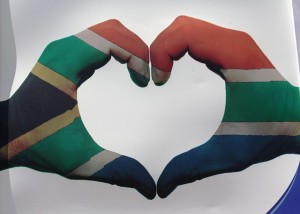![By NASA [Public domain], via Wikimedia Commons Tunde Folawiyo](http://upload.wikimedia.org/wikipedia/commons/thumb/1/16/Africaaaaaaaaa.jpg/256px-Africaaaaaaaaa.jpg) The African Leadership Academy in Johannesburg, South Africa, is bringing a brighter future to its students and to the world through education in leadership, entrepreneurial skills, and the history of the African continent. The school has attracted students from all over the world, including students from each of the fifty-four countries in Africa. Since its founding in 2004 by Acha Leke, Chris Branford, Peter Mombaur, and Fred Swaniker, the ALA has been fulfilling its mission to support the development of young people, and to equip them to solve the complicated problems Africa and the world face in the modern age.
The African Leadership Academy in Johannesburg, South Africa, is bringing a brighter future to its students and to the world through education in leadership, entrepreneurial skills, and the history of the African continent. The school has attracted students from all over the world, including students from each of the fifty-four countries in Africa. Since its founding in 2004 by Acha Leke, Chris Branford, Peter Mombaur, and Fred Swaniker, the ALA has been fulfilling its mission to support the development of young people, and to equip them to solve the complicated problems Africa and the world face in the modern age.
Along with the MasterCard Foundation, the Silicon Valley Community Foundation, and other contributors, the African Leadership Academy is also a sponsor of the Anzisha Prize, an award for young entrepreneurs working within communities in Africa to find fresh solutions to local problems. The prize is meant to encourage the development of novel products and services while getting young people involved in business and entrepreneurship. Since the prize was first awarded in 2011, the foundation has appointed dozens of Fellows, whose projects range from a local website development firm to a perfume company and a rabbit farm. Recent winner Barclay Paul Okari, a 21-year-old from Kenya, launched a company to produce cheap, washable sanitary towels for women, after finding out that the cost of disposable sanitary towels was prohibitive and keeping girls and women from being able to attend school. Finalists for the prize all win a trip to South Africa, and the ultimate prize winners receive a share of $75,000. In addition to the Anzisha Fellowship, Okari won an additional grant and a trip to Palo Alto, California. Anzisha Fellows win more than acknowledgement of their current achievements, but also are connected to the mentoring network provided by the ALA.
African Leadership Academy graduates are connected to leaders in many fields to ensure their ability to thrive in the real world. In addition to a network of mentors, the school has a Global Advisory Council staffed with top thinkers in the fields of education and business. By working to support the ALA, citizens worldwide, such as Tunde Folawiyo, are investing in the future of the entire continent. For more information on this Nigerian businessman, see video updates from Tunde Folawiyo’s page at Daily Motion.
 In 2004, Fred Swaniker founded the African Leadership Academy, a school with the ambition to provide an educational environment that could prepare students to be leaders and entrepreneurs, and ensure a better future for Africa. Swaniker, who was born in Ghana and graduated from the Stanford School of Business, was facing the growing concern that wealthy families in African were consistently choosing schools in the US and UK for their children’s educations. Swaniker believed that students educated in Africa would have more invested in Africa’s future. Many students at the African Leadership Academy receive financial assistance, and tuitions can be waived for students who commit to returning to Africa after graduating from college.
In 2004, Fred Swaniker founded the African Leadership Academy, a school with the ambition to provide an educational environment that could prepare students to be leaders and entrepreneurs, and ensure a better future for Africa. Swaniker, who was born in Ghana and graduated from the Stanford School of Business, was facing the growing concern that wealthy families in African were consistently choosing schools in the US and UK for their children’s educations. Swaniker believed that students educated in Africa would have more invested in Africa’s future. Many students at the African Leadership Academy receive financial assistance, and tuitions can be waived for students who commit to returning to Africa after graduating from college.![By Bjoertvedt (Own work) [CC-BY-SA-3.0 (http://creativecommons.org/licenses/by-sa/3.0) or GFDL (http://www.gnu.org/copyleft/fdl.html)], via Wikimedia Commons Tunde Folawiyo](http://upload.wikimedia.org/wikipedia/commons/thumb/6/6d/Duke_University_08.jpg/256px-Duke_University_08.jpg) excellent grades, coupled with her obvious entrepreneurial skills, are what led to Ola being named as one of the five students to be accepted into Duke University, through the MasterCard Foundation Scholarship programme.
excellent grades, coupled with her obvious entrepreneurial skills, are what led to Ola being named as one of the five students to be accepted into Duke University, through the MasterCard Foundation Scholarship programme.![By self (Own work) [Public domain], via Wikimedia Commons Tunde Folawiyo](http://upload.wikimedia.org/wikipedia/commons/thumb/4/40/MedicalCenter.jpg/256px-MedicalCenter.jpg) Those who are familiar with the African Leadership Academy, like Tunde Folawiyo, will understand that its annual graduation ceremony is a particularly momentous occasion for its students and their families, as it celebrates the successful completion of an exceptionally challenging academic course. It is also the day on which the ALA committee announces the recipients of the Allan Gray Awards, which are given to graduates who have demonstrated excellence within the field of social entrepreneurialism. At last year’s graduation ceremony, a young woman named Maimuna Yussuf was named as the winner of the Gold Allan Gray prize.
Those who are familiar with the African Leadership Academy, like Tunde Folawiyo, will understand that its annual graduation ceremony is a particularly momentous occasion for its students and their families, as it celebrates the successful completion of an exceptionally challenging academic course. It is also the day on which the ALA committee announces the recipients of the Allan Gray Awards, which are given to graduates who have demonstrated excellence within the field of social entrepreneurialism. At last year’s graduation ceremony, a young woman named Maimuna Yussuf was named as the winner of the Gold Allan Gray prize.![UNCCTF at the English language Wikipedia [GFDL (http://www.gnu.org/copyleft/fdl.html) or CC-BY-SA-3.0 (http://creativecommons.org/licenses/by-sa/3.0/)], via Wikimedia Commons Tunde Folawiyo](http://upload.wikimedia.org/wikipedia/commons/thumb/1/1c/UNCCNewQuad.jpg/256px-UNCCNewQuad.jpg) The level of excellence which he demonstrated in his studies also led to him being accepted into the University of North Carolina, and receiving a full scholarship from the Morehead Cain Foundation, which has allowed him to pursue a double-major degree in political science and business.
The level of excellence which he demonstrated in his studies also led to him being accepted into the University of North Carolina, and receiving a full scholarship from the Morehead Cain Foundation, which has allowed him to pursue a double-major degree in political science and business. Anzisha Prize was born out of a need for young entrepreneurial leaders to assist in tackling the various issues facing the African economy. In addition to creating jobs and driving these economies, the ALA’s young leaders are encouraged to involve themselves with a variety of social issues faced by their respective communities. It was the organisation’s belief in youth-led change that inspired the Prize.
Anzisha Prize was born out of a need for young entrepreneurial leaders to assist in tackling the various issues facing the African economy. In addition to creating jobs and driving these economies, the ALA’s young leaders are encouraged to involve themselves with a variety of social issues faced by their respective communities. It was the organisation’s belief in youth-led change that inspired the Prize. The ALA’s Entrepreneurial Leadership programme was designed to foster the social and economic skills of the continent’s brightest young minds. During a student’s first year, he or she will be encouraged to develop the skills and mindset necessary to become highly successful entrepreneurial leaders within their respective communities. The first year syllabus revolves around a rigorous curriculum aiming to prepare students for what lies ahead by utilizing team-based challenges, mini-lectures, guest speakers, games and case studies. These methods promote optimal personal growth and responsibility amongst students, propelling them toward great future success. In addition to a range of other basic coursework, students will be required to adequately educate themselves of the broad range of challenges to be combatted throughout Africa. It is only with a great knowledge of these challenges that true solutions may come about.
The ALA’s Entrepreneurial Leadership programme was designed to foster the social and economic skills of the continent’s brightest young minds. During a student’s first year, he or she will be encouraged to develop the skills and mindset necessary to become highly successful entrepreneurial leaders within their respective communities. The first year syllabus revolves around a rigorous curriculum aiming to prepare students for what lies ahead by utilizing team-based challenges, mini-lectures, guest speakers, games and case studies. These methods promote optimal personal growth and responsibility amongst students, propelling them toward great future success. In addition to a range of other basic coursework, students will be required to adequately educate themselves of the broad range of challenges to be combatted throughout Africa. It is only with a great knowledge of these challenges that true solutions may come about. The ALA holds a range of academic requirements in order for students to best understand the totality of the challenges encountered by millions throughout Africa. The institution employs a credits system wherein students must earn a certain amount of credits to merit an ALA diploma. A two-year entrepreneurial course serves as the ALA’s flagship course, challenging students to develop the proper mindset, approaches and necessary skills to become entrepreneurial leaders within the continent. A requirement for all students, this course offers participants teachings in economic success, a principle skill for forging a positive impact upon the continent.
The ALA holds a range of academic requirements in order for students to best understand the totality of the challenges encountered by millions throughout Africa. The institution employs a credits system wherein students must earn a certain amount of credits to merit an ALA diploma. A two-year entrepreneurial course serves as the ALA’s flagship course, challenging students to develop the proper mindset, approaches and necessary skills to become entrepreneurial leaders within the continent. A requirement for all students, this course offers participants teachings in economic success, a principle skill for forging a positive impact upon the continent. Those who are familiar with the ALA, like Tunde Folawiyo, are no doubt aware that whilst its pupils often come from very different backgrounds, they all share a passion for
Those who are familiar with the ALA, like Tunde Folawiyo, are no doubt aware that whilst its pupils often come from very different backgrounds, they all share a passion for  Nokwanda Ramatheko is a graduate of the African Leadership Academy; like many of its students, her younger years were filled with challenges, which she had to overcome in order to achieve her
Nokwanda Ramatheko is a graduate of the African Leadership Academy; like many of its students, her younger years were filled with challenges, which she had to overcome in order to achieve her